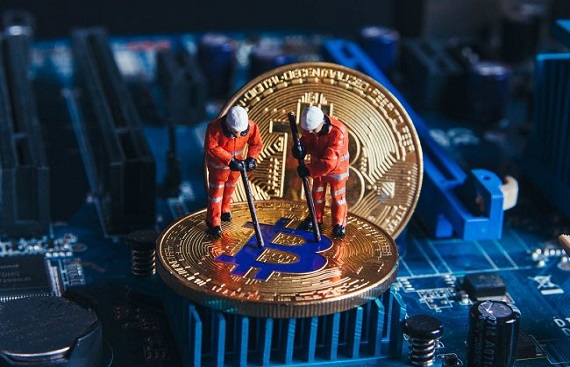Bitcoin: All you need to know about Crypto Mining in India

Bitcoin, a digital currency administered by a single controller sent from user to user on the peer-to-peer bitcoin network without mediators. Bitcoins are designed as a reward for a method known as mining. They can be traded for other currencies, products, and services, but the real-world price of the coins is highly expansive.
Billions of people around the world use cryptocurrencies, yet no country owns it or controls it. Cryptocurrency is also somewhat like the Internet. It is not owned or managed by a country or a bank. They are not issued by the country's central bank, in our case, the Reserve Bank Of India, as legal tender. Neither are they recognized by the Government as legal tender, nor are they regulated by the RBI. There are no laws that prohibit or allow trading in crypto. In that sense, cryptocurrency is like any other asset class such as gold, commodities, or real estate. People trade in gold without the Government creating a law for it. The same is the status of cryptocurrency at the moment. It isn’t a legitimate currency in the conventional sense, which means that you cannot spend cryptocurrency to buy or sell anything in India. The currency of a country is legal tender upheld by a sovereign guarantee. In India, only the RBI can issue any currency.
Cryptocurrency is a fast-growing area as an impressive option among investors in India. The earlier years have seen a burgeoning number of investors, and analytics indicate that it isn’t just city slickers - most of its recent users come from small cities and towns in India. Nevertheless mounting excitement, much uncertainty endures around the legality of cryptocurrency in India. If you think investing in cryptocurrencies, you want to be sure you are not violating any law or regulations. Therefore, it’s necessary to know the legality that surrounds cryptocurrencies.
Owning Bitcoin
When it comes to ownership, bitcoins are enrolled to bitcoin addresses. Generating a bitcoin address expects nothing more than choosing a random actual private key and calculating the identical bitcoin address. This computation can be done in a split second. But the reverse, computing the private key of a given bitcoin address, is practically unfeasible. Users can show others or make public a bitcoin address without compromising its corresponding private key.
Moreover, the number of valid private keys is so huge that it is doubtful someone will calculate a key-pair already in use and has funds. The immense number of right private keys makes it unfeasible that brute force could negotiate a private key. To spend their bitcoins, the owner must remember the corresponding private key and digitally sign the transaction. The network identifies the signature using the public key; the private key is never revealed.
Crypto Mining
Mining is an account-keeping aid done with the help of computer processing power. Miners maintain the blockchain constant, complete, and unchangeable by regularly grouping newly broadcast activities into a block, then transmitted to the network and confirmed by recipient nodes. Every block contains a SHA-256 cryptographic hash of the previous block, thus combining it to the last block and giving the blockchain its name.
To be taken by the rest of the network, a new block must contain a proof-of-work (PoW). The system utilized is based on Adam Back's 1997 anti-spam scheme, Hashcash. The PoW needs miners to find a number called a nonce (number used once), such that if the block content is hashed onward with the nonce, the result is numerically smaller than the network's difficulty target. This evidence is accessible for any node in the network to check but very time-consuming to produce. As for a secure cryptographic hash, miners must try many various nonce values. Usually, the series of examined values is the ascending natural numbers from (0, 1, 2, 3...) before an event happens to be less than the difficulty target.
How is crypto mining a challenge in India?
![]()
Nischal Shetty, Founder & CEO at WazirX, said, There has been an uptick in cryptocurrency mining in India in recent years. Companies such as Easyfi Network provide mining facilities and blockchain development in the country. Still, there is no official information available on the same. He also believes there could be some other pockets of small-scale mining operations in some parts of the country.
Many in the ecosystem think that supporting crypto-mining could give the country many benefits. “When you enable mining operations, there are two things that can occur with it - one is investment and the other is employment. And there is an economic activity that produces around that. So India could take advantage if it wanted”. But most things related to cryptocurrencies in India, mining can be risky, Nischal Shetty added.
India does not have any specific rules for cryptocurrencies. The Indian government and central bank have criticized the asset class and even temporarily stopped banks from facilitating such transactions. They have also shown launching their digital coin. In 2017, India banned the import of ASCI machines specially designed for crypto mining, which forced Bengaluru-based blockchain technology company AB Nexus to quit mining bitcoin and ethereum.
Does Bitcoin help the Indian Economy?
![]()
Shaktikanta Das, governor of the Reserve Bank of India, says, “We have conveyed our serious and major concerns about cryptocurrencies to the government from the point of view of financial stability.“ I think we need more credible answers as to whether, in the future, the whole private cryptocurrencies, what contribution it will make to the Indian economy going forward.
On a similar note, India has been taking steps towards its own form of a legally recognized digital rupee, called the Central Bank Digital Currency. The RBI is readying up for a phased introduction of the asset. Unlike cryptocurrency, the Central Bank Digital Currency will be regulated. Most interestingly, it will not be an asset but a digital reflection of the current monetary system. It will be exchangeable one-to-one with the Indian Rupee.
On the other hand, cryptocurrencies can be considered commodities with a set value like gold or silver. That value will be uniform across the board, irrespective of the country it is being traded within. The only factor to be considered is the currency conversion rate that would represent that value. However, few countries have even come close to the pilot stage of launching such an endeavor.


.jpg)
